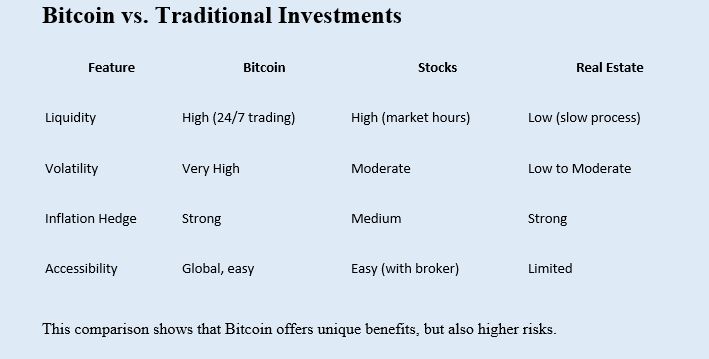Introduction
For the last 10 years, the cryptocurrency space has taken the world by storm. Bitcoin, the first digital asset, is still making news in the financial sector, and bringing questions and debates to investors, economists, and governments. While it has been through major price fluctuations, increased competition, and significant regulatory changes, now is the time to ask yourself whether you should buy Bitcoin in today’s market.
In this article, we will describe what Bitcoin is, how it works, the benefits and drawbacks to Bitcoin, and whether or not Bitcoin remains a viable investment in 2025 and possibility beyond.
What is Bitcoin?
Bitcoin is a decentralized digital currency that was created in 2009 by a developer who remains largely anonymous, known as Satoshi Nakamoto. Bitcoin is different from the currency offered by your central bank because Bitcoin runs on the blockchain. The blockchain is a set of distributed ledgers that keep track of every transaction securely, shared and only visible to relevant participants.
Key Features of Bitcoin
• Decentralization – There is no entity that manages Bitcoin.
• Limited Supply – There will only ever be 21 million Bitcoins.
• Worldwide – As long as you have access to the internet, you can use it.
• Security – Transactions are verified through cryptography and mining.
Why Bitcoin Became Well Known
Several factors contributed to Bitcoin’s rapid rise to prominence:
- Hedge Against Inflation
Investors are describing Bitcoin as “digital gold” due to its limited coin supply - Transparency and Security
Transactions are recorded on a public blockchain that require consensus to change, rendering unauthorized manipulation of that record nearly impossible. - Decentralized Finance (DeFi) Movement
Bitcoin initiated DeFi and inspired thousands of cryptocurrencies and alternative financial systems external to central banks. - Media and Institutional Commitment
The big jump in trust, amplitude, and visibility increased when companies like Tesla and institutional players, such as Fidelity, began investing in Bitcoin.
Is Bitcoin Still Worth an Investment?
The question experienced investors seem to have today is: Is Bitcoin a still great investment, or was it great and our time has now passed? Let’s break this down.
Pros of Investing in Bitcoin
- Scarcity and limited supply
Only 21 million will ever exist, and demand spikes during times of uncertainty. - Liquidity
It is the most traded cryptocurrency in the world. You can buy and sell whenever you want on exchanges, and this is typically over a 24-7 basis. - Institutional buy-in
Big companies and hedge funds are currently buying and holding Bitcoin as part of their portfolios, which is signalling long-term confidence! - Access
You can invest with as little as $10 with fractional Bitcoin purchases!
Cons of investing in Bitcoin - Price volatility
Bitcoin can swing up and down thousands of dollars in a single day, meaning it is not a very good bet for short-term investors. - Compliance
The government is passing new laws all over the world about cryptocurrency, which could slow adoption and prevent growth. - Competition
There are plenty of other cryptocurrencies out there, and many are easier to use, have cheaper fees, and offer unique benefits. Pplatforms like Ethereum, Solana, and Ripple have some advantages that may attract new investors as well. - Security risks
Bitcoin is secure. However, people can still lose cryptocurrency on exchanges and wallets or lose access to their accounts altogether! Be careful!
Bitcoin Investment Strategies
So, if you are thinking about investing in Bitcoin, here are the most common strategies:
- Buy and hold (HODL)
Investors buy Bitcoin (and other cryptocurrencies) in the expectation of a long-term increase in value which could take years. - Dollar-Cost Averaging (DCA)
Investing small amounts frequently can limit your risk of investing during a market peak. - Trading
Trading is more than just buying and selling. It is when investors buy and sell Bitcoin frequently (even daily) in an effort to capitalize on Bitcoin’s price swings. Trading requires knowledge and experience. - Portfolios
Smart money, that is investors who follow the funding protocol of putting money in several assets such as stocks, real estate or even other cryptocurrencies will not only be investing in bitcoin.

Bitcoin’s Future
Institutional Adoption
Additional companies are likely to adopt Bitcoin as a payment option as well as to hold it in reserves.
Regulation
Regulation is likely to increase, possibly streamlining the Bitcoin market as well as reducing anonymity.
Bitcoin Halving
Every four years, the amount of Bitcoin rewarded to miners is cut in half. The next halving is likely to contribute scarcity and an increase in price.
Technological Innovation
Scaling solutions such as the Lightning network are now allowing quicker, cheaper transactions to make Bitcoin useful as a currency.
Should you still invest in Bitcoin in 2025?
This depends on your financial purposes.
• If you are looking for long term growth: Bitcoin is still a strong contender as “digital gold.”
• If you are a risk-averse investor: You will be overwhelmed by the volatility of Bitcoin, which may not suit your appetite for risk.
• If you are a balanced investor: You may still want to add some Bitcoin with a small percentage of your portfolio (2-5%) to provide further diversification.
The Proper Way to Safely Invest in Bitcoin
- Find a trusted exchange, to use. Examples of exchanges with great reputations are Coinbase, Binance, and Kraken.
- Use a secure wallet. Hardware wallets like Ledger or Trezor will help keep you safe.
- Use two-factor-authentication (2FA). Always protect your accounts.
- Don’t act on emotion. Let’s base our investments on research and not trend-worship.
- Maintain your education. Follow cryptocurrency news sources you can rely on.
Final Thoughts
Bitcoin has demonstrated that it could be a disruptive financial technology. Although there are still overall risks, the relative scarcity and the growth of network effect makes bitcoin a serious investment even today.
It depends on your risk tolerance, financial aspirations, and investment strategy, separate of your interest in bitcoin itself, to dictate when and how to invest, or if to invest. The best practice is to stay educated, invest methodically and intentionally, and never put in money you cannot afford to lose.
